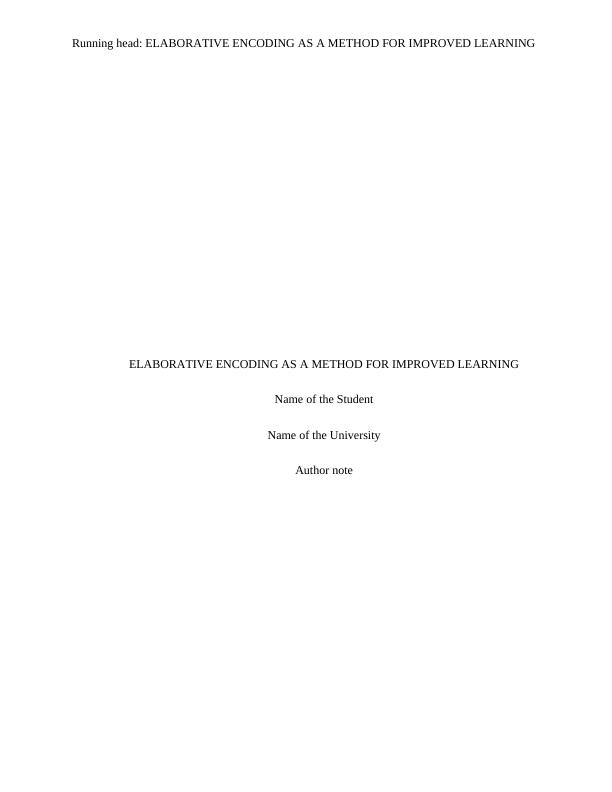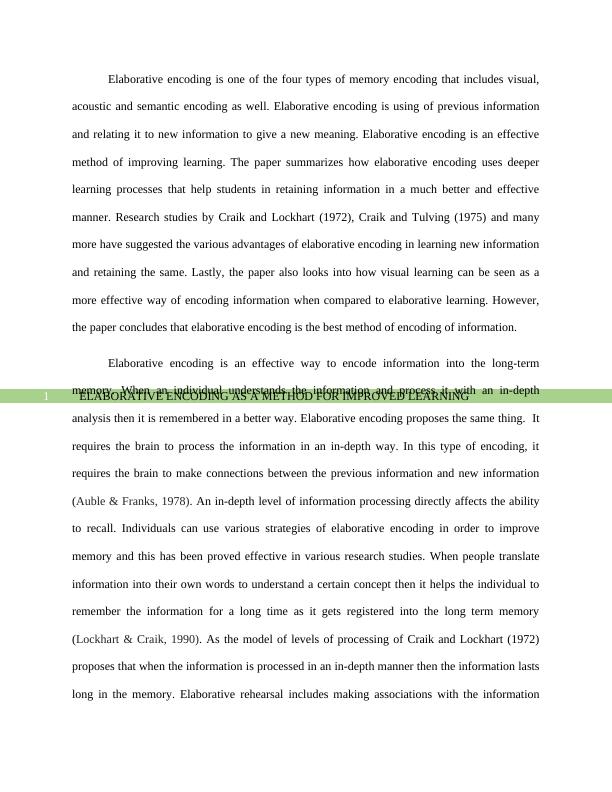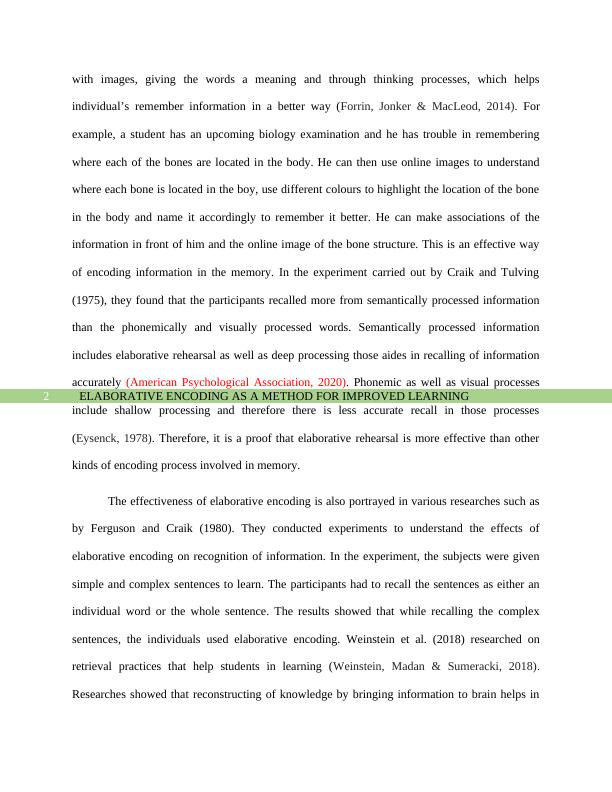Memory Encoding Assignment Report
Added on 2022-09-14
8 Pages2143 Words16 Views
Running head: ELABORATIVE ENCODING AS A METHOD FOR IMPROVED LEARNING
ELABORATIVE ENCODING AS A METHOD FOR IMPROVED LEARNING
Name of the Student
Name of the University
Author note
ELABORATIVE ENCODING AS A METHOD FOR IMPROVED LEARNING
Name of the Student
Name of the University
Author note

ELABORATIVE ENCODING AS A METHOD FOR IMPROVED LEARNING1
Elaborative encoding is one of the four types of memory encoding that includes visual,
acoustic and semantic encoding as well. Elaborative encoding is using of previous information
and relating it to new information to give a new meaning. Elaborative encoding is an effective
method of improving learning. The paper summarizes how elaborative encoding uses deeper
learning processes that help students in retaining information in a much better and effective
manner. Research studies by Craik and Lockhart (1972), Craik and Tulving (1975) and many
more have suggested the various advantages of elaborative encoding in learning new information
and retaining the same. Lastly, the paper also looks into how visual learning can be seen as a
more effective way of encoding information when compared to elaborative learning. However,
the paper concludes that elaborative encoding is the best method of encoding of information.
Elaborative encoding is an effective way to encode information into the long-term
memory. When an individual understands the information and process it with an in-depth
analysis then it is remembered in a better way. Elaborative encoding proposes the same thing. It
requires the brain to process the information in an in-depth way. In this type of encoding, it
requires the brain to make connections between the previous information and new information
(Auble & Franks, 1978). An in-depth level of information processing directly affects the ability
to recall. Individuals can use various strategies of elaborative encoding in order to improve
memory and this has been proved effective in various research studies. When people translate
information into their own words to understand a certain concept then it helps the individual to
remember the information for a long time as it gets registered into the long term memory
(Lockhart & Craik, 1990). As the model of levels of processing of Craik and Lockhart (1972)
proposes that when the information is processed in an in-depth manner then the information lasts
long in the memory. Elaborative rehearsal includes making associations with the information
Elaborative encoding is one of the four types of memory encoding that includes visual,
acoustic and semantic encoding as well. Elaborative encoding is using of previous information
and relating it to new information to give a new meaning. Elaborative encoding is an effective
method of improving learning. The paper summarizes how elaborative encoding uses deeper
learning processes that help students in retaining information in a much better and effective
manner. Research studies by Craik and Lockhart (1972), Craik and Tulving (1975) and many
more have suggested the various advantages of elaborative encoding in learning new information
and retaining the same. Lastly, the paper also looks into how visual learning can be seen as a
more effective way of encoding information when compared to elaborative learning. However,
the paper concludes that elaborative encoding is the best method of encoding of information.
Elaborative encoding is an effective way to encode information into the long-term
memory. When an individual understands the information and process it with an in-depth
analysis then it is remembered in a better way. Elaborative encoding proposes the same thing. It
requires the brain to process the information in an in-depth way. In this type of encoding, it
requires the brain to make connections between the previous information and new information
(Auble & Franks, 1978). An in-depth level of information processing directly affects the ability
to recall. Individuals can use various strategies of elaborative encoding in order to improve
memory and this has been proved effective in various research studies. When people translate
information into their own words to understand a certain concept then it helps the individual to
remember the information for a long time as it gets registered into the long term memory
(Lockhart & Craik, 1990). As the model of levels of processing of Craik and Lockhart (1972)
proposes that when the information is processed in an in-depth manner then the information lasts
long in the memory. Elaborative rehearsal includes making associations with the information

ELABORATIVE ENCODING AS A METHOD FOR IMPROVED LEARNING2
with images, giving the words a meaning and through thinking processes, which helps
individual’s remember information in a better way (Forrin, Jonker & MacLeod, 2014). For
example, a student has an upcoming biology examination and he has trouble in remembering
where each of the bones are located in the body. He can then use online images to understand
where each bone is located in the boy, use different colours to highlight the location of the bone
in the body and name it accordingly to remember it better. He can make associations of the
information in front of him and the online image of the bone structure. This is an effective way
of encoding information in the memory. In the experiment carried out by Craik and Tulving
(1975), they found that the participants recalled more from semantically processed information
than the phonemically and visually processed words. Semantically processed information
includes elaborative rehearsal as well as deep processing those aides in recalling of information
accurately (American Psychological Association, 2020). Phonemic as well as visual processes
include shallow processing and therefore there is less accurate recall in those processes
(Eysenck, 1978). Therefore, it is a proof that elaborative rehearsal is more effective than other
kinds of encoding process involved in memory.
The effectiveness of elaborative encoding is also portrayed in various researches such as
by Ferguson and Craik (1980). They conducted experiments to understand the effects of
elaborative encoding on recognition of information. In the experiment, the subjects were given
simple and complex sentences to learn. The participants had to recall the sentences as either an
individual word or the whole sentence. The results showed that while recalling the complex
sentences, the individuals used elaborative encoding. Weinstein et al. (2018) researched on
retrieval practices that help students in learning (Weinstein, Madan & Sumeracki, 2018).
Researches showed that reconstructing of knowledge by bringing information to brain helps in
with images, giving the words a meaning and through thinking processes, which helps
individual’s remember information in a better way (Forrin, Jonker & MacLeod, 2014). For
example, a student has an upcoming biology examination and he has trouble in remembering
where each of the bones are located in the body. He can then use online images to understand
where each bone is located in the boy, use different colours to highlight the location of the bone
in the body and name it accordingly to remember it better. He can make associations of the
information in front of him and the online image of the bone structure. This is an effective way
of encoding information in the memory. In the experiment carried out by Craik and Tulving
(1975), they found that the participants recalled more from semantically processed information
than the phonemically and visually processed words. Semantically processed information
includes elaborative rehearsal as well as deep processing those aides in recalling of information
accurately (American Psychological Association, 2020). Phonemic as well as visual processes
include shallow processing and therefore there is less accurate recall in those processes
(Eysenck, 1978). Therefore, it is a proof that elaborative rehearsal is more effective than other
kinds of encoding process involved in memory.
The effectiveness of elaborative encoding is also portrayed in various researches such as
by Ferguson and Craik (1980). They conducted experiments to understand the effects of
elaborative encoding on recognition of information. In the experiment, the subjects were given
simple and complex sentences to learn. The participants had to recall the sentences as either an
individual word or the whole sentence. The results showed that while recalling the complex
sentences, the individuals used elaborative encoding. Weinstein et al. (2018) researched on
retrieval practices that help students in learning (Weinstein, Madan & Sumeracki, 2018).
Researches showed that reconstructing of knowledge by bringing information to brain helps in

End of preview
Want to access all the pages? Upload your documents or become a member.
Related Documents
Research Paper on Loci Methodlg...
|11
|2724
|645
Note-Taking and Memory in Laboratory Settingslg...
|11
|2513
|133
Research Paper on Memory 2022lg...
|8
|1824
|32
Loci Technique- Memory Strategylg...
|12
|3069
|541
Perceived Effects of Memory Techniques on the Amount of Words Recalledlg...
|17
|3297
|281
Memory and Information Processinglg...
|8
|1192
|279
